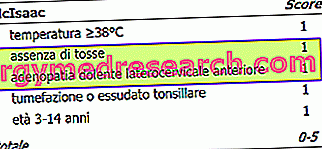What is Tonsillitis?
Tonsillitis is the inflammation of the tonsils, with particular reference to the palatine tonsils, two ovoid organs - about 2.5 - 3.5 cm long and two wide - made up of lymphoid tissue and placed on the sides of the throat, immediately behind and above the base of the tongue. The task of the tonsils is to protect the individual from bacteria and viruses that penetrate the body through the mouth and nose; precisely the massive presence of these pathogens determines that inflammatory phenomenon known as tonsillitis; in particular, the disease is generally of viral origin (about 70% of the cases), while it is more rarely caused by bacteria.
Causes
Among the numerous viruses that can cause tonsillitis, we recall the Adenovirus, the Rhinoviruses responsible for the "common cold", the Epstein Barr virus responsible for mononucleosis, but also HIV and enterovirus.
Among the bacteria involved in the genesis of tonsillitis - especially in childhood - Streptococcus pyogenes is frequently isolated; if it is not correctly treated, this "infamous" microorganism - also known as SBEA or group A haemolytic streptococcus - can cause complications of a certain relevance (suppurative - otitis, sinusitis, peritonsillar abscess - or with pus absence - rheumatic disease, inflammation of the kidneys -). Consequently, while in most cases only home treatment with over-the-counter drugs is sufficient, antibiotics may be required in the presence of bacterial tonsillitis.
Symptoms and diagnosis
Deepening: Symptoms Tonsillitis
Tonsillitis is manifested by a series of general and specific symptoms, among which stands out the uniform swelling of the tonsils, with the appearance of holes on their surface, from which whitish material emerges; local hyperaemia can be evident with their redness. Among the non-specific symptoms, there is the appearance of fever, sore throat, lowering of the voice, pain on swallowing, headache, malaise and nausea, with swollen lymph nodes of the neck and submandibular ones.
Streptococcal tonsillitis should be suspected in the event of sudden onset of symptoms, with swallowing pain radiating to the ear and associated with swelling of the lymph nodes in the neck and the absence of nasal congestion.
McIsaac's score for the clinical suspicion of streptococcal pharyngitis

One point is awarded for each positive answer; all the points are added and a final score is obtained which can vary from 0 to 5. In case of low score (0-1) it is unlikely that there is an infection with S. pyogenes; in the case of a high score (4-5), the diagnosis of streptococcal pharyngitis is much more likely. The use of the score alone is not sufficient to make a definitive diagnosis.
Only the execution of a pharyngeal swab related to an enzyme immunoassay of the SBEA allows us to formulate a certain differential diagnosis between viral and bacterial tonsillitis. In this sense, there is a specific examination that provides results within a few minutes; however, in some cases longer times may be required, necessary for performing cultural examinations of various kinds.
Contagion and risk factors
Tonsillitis is particularly common in school-age children, while it is less common over 12 years. Disease transmission is particularly rapid in confined environments, such as schools and childcare facilities, where people are in close contact. The risk of infection is higher for viral forms, while streptococcal tonsillitis is transmitted only through close contact during the initial phase of the disease (even considering that these germs are often present in the individual in a silent way).
Care and prevention
Deepening: Drugs for the treatment of tonsillitis
Antibiotic therapy (generally with amoxicillin) is effective only in the case of bacterial infection, as it can do nothing against the viral forms. Consequently it is very important that the doctor uses a rapid test (called RAD) before deciding on the appropriate therapeutic strategy, thus avoiding - to accumulate dangerous delays or to undertake unnecessary and / or harmful therapies (eg antibiotic resistance, debilitation of the organism, waste of economic resources).
Tonsillitis benefits from rest and generous intake of liquids, preferably hot, such as soups, broth, milk and tea. Anti-inflammatory drugs (paracetamol or ibuprofen) can be taken on the advice of your doctor or pharmacist to reduce fever and pain; in this regard it is worth remembering the prohibition of administering aspirin to children under the age of 12 and the futility of antibiotics for viral forms.
It is possible that a subject is particularly susceptible to contracting these infections; in this case one speaks of chronic or recurrent tonsillitis, associated or not with an enlarged (hypertrophy) of the tonsils. Both situations may be an indication of their removal (tonsillectomy). In this regard it is recalled that in the child the tonsils prevent infections also thanks to a direct immunological function (production of antibodies), which remains important until 4 - 6 years of life. For this reason, even in the presence of recurrent tonsillitis, in recent decades there has been a drastic reduction in these interventions, now practiced only when the symptoms are so severe that they interfere with normal daily activities. A case in point is a complication called "obstructive sleep apnea due to adenotonsillar hypertrophy", due to mechanical obstruction (hypertrophy of the tonsils) that is created, reducing or even temporarily interrupting the normal respiratory flow. Tonsillectomy is generally an outpatient procedure.
In the preventive context, it is advisable to refrain from smoking - whether active or passive - to avoid direct exposure to exhaust gases and to maintain the correct humidification of the domestic environment. To prevent the spread of the disease, isolation of the patient is important, avoiding the promiscuous use of glasses, cutlery and handkerchiefs. Finally, remember that frequent hand washing is the best way to prevent all types of infections, including tonsillitis.
Also read: Tonsillitis Remedies



